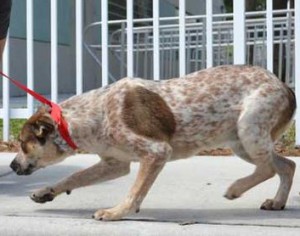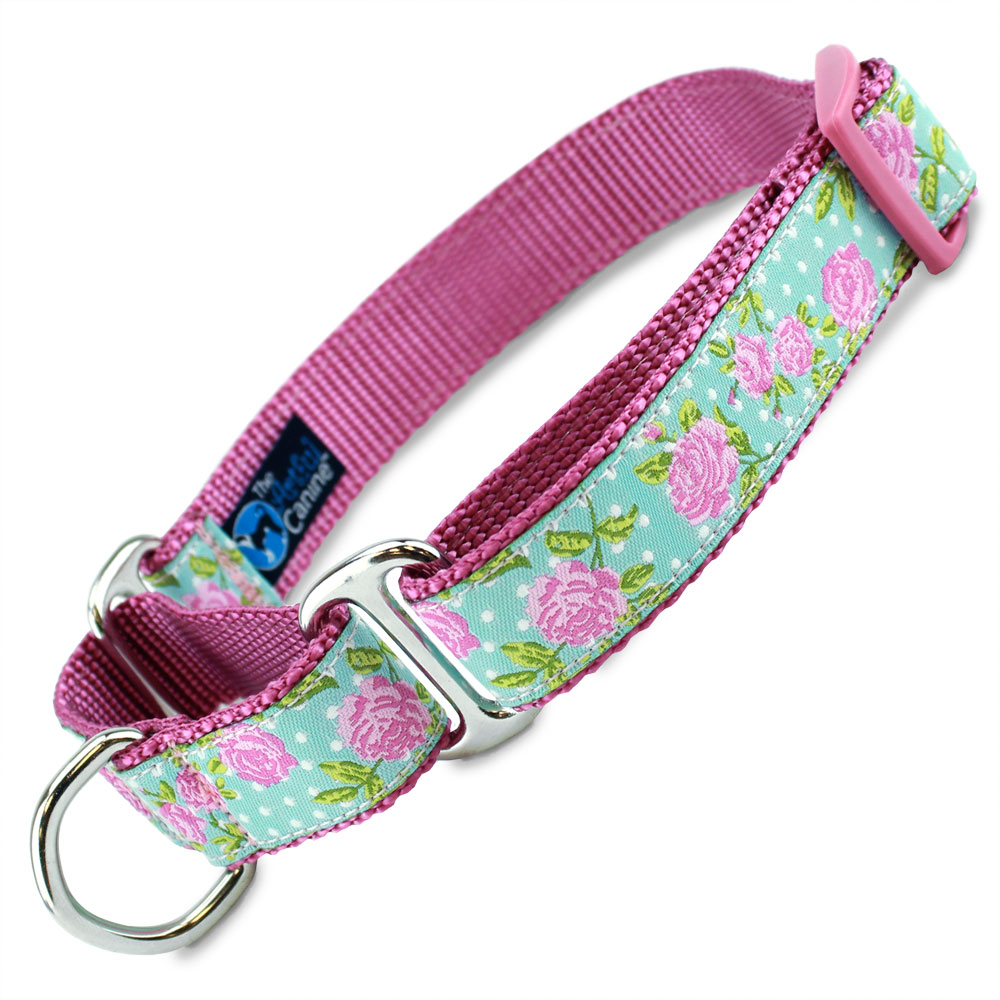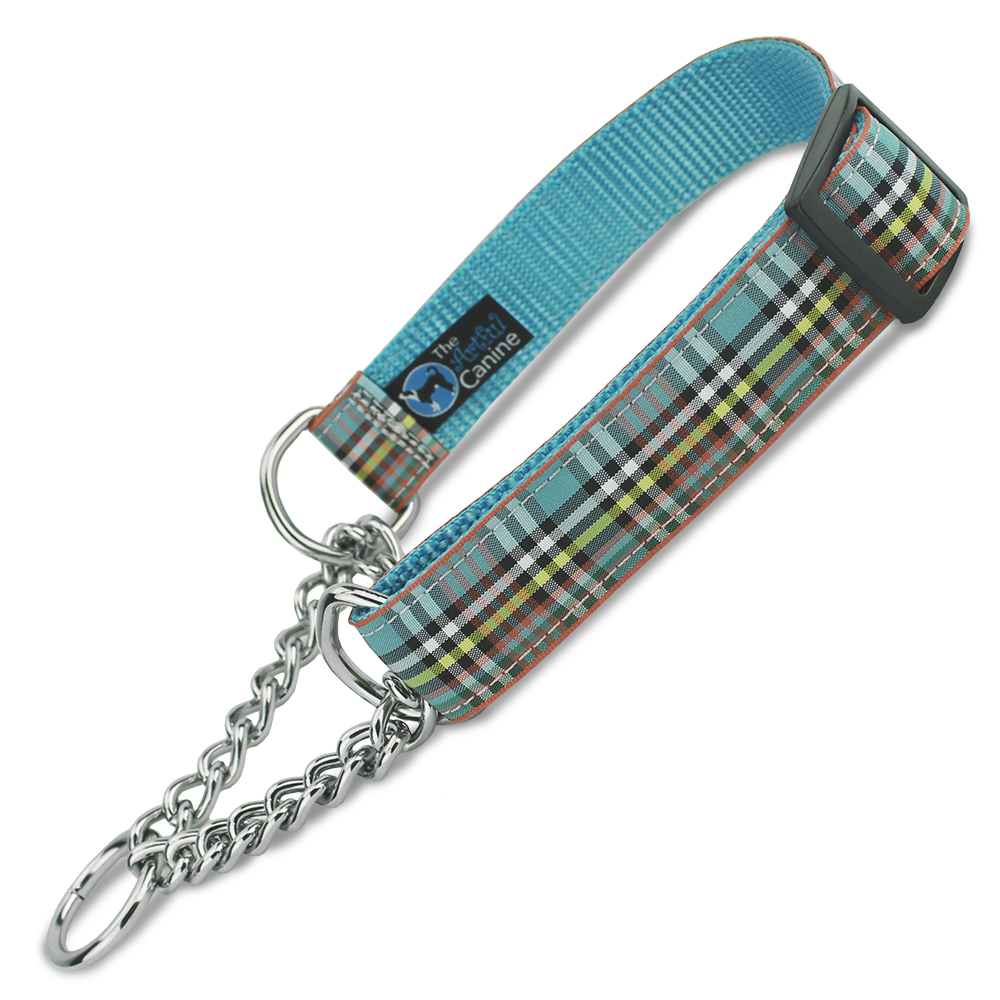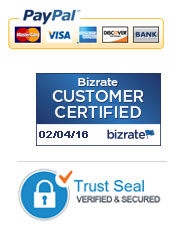What Type of Dog Collar is Best?
by Joanne on April 26, 2017 - Leave a Comment
What type of collar is best for your dog? It all comes down to your dogs age, breed, behavior and walking needs. So start with a list of these characteristics first. Then consider “human” factors like aesthetics, colors and design appeal. The type of collar that is best will be one that keeps your dog safe, give you control on walks, and be aesthetically appealing to you. Below is a short list of questions that will help you find the best dog collar with all these considerations.
Is your Dog a Puppy or Adult?

If you have had your dog for a while, you can skip this question and move on to the next. But if you’ve got a new puppy, size matters. Understand that your puppy will grow, and the collar you buy today will not likely fit him/her as an adult. So the dog collar that is best for your dog today may not be the best tomorrow. You will be training your puppy to walk on leash. Your puppy will grow. If you have an adult shelter dog, he/she may have issues or needs you are unaware of. In either case, think “temporary” and get something simple & safe to start. Dog collar nirvana will come after you’ve had your dog for a while and know his/her behavior and needs.
Is your dogs head bigger (or smaller) that his head?
This is important because dogs with narrow heads slip out of standard buckle (or quick release) collars easily. If you plan on going anywhere with your dog, the best collar for your dog is one that he/she can’t slip out of. While a standard collar is fine for around the house, you may be putting your dog at risk when walking on leash outdoors. In this case shop for a martingale collar, which is a type of collar style for dogs with this physique.
Is your dog outdoors or indoors most of the time?
This speaks to you and your dogs lifestyle, and not tying your dog out on a tether (which we do not recommend). If you and your dog have an active, outdoor lifestyle you’ll want a dog collar that’s rugged and will withstand the elements. If our dog is in the ocean or pool everyday, you’ll want a collar with hardware that won’t rust, or is waterproof. Just keep in mind the maintenance of the collar, because a collar that is waterproof will not be easy to clean, and a leather collar may be durable, but can’t be washed and will develop an odor after time.
Dog your dog have any allergies or health issues?
Some dogs necks get irritated easily by chemicals (like flea collars) or materials that are synthetic. If this is the case with your dog, look for natural materials like cotton or hemp, so long as it is enough layers to make it durable. Also be mindful of the collar hardware – a dog with skin allergies can be sensitive to some metals.
If your dog has health issues related to their neck, you may want to ditch the idea of a collar a consider a dog harness instead. If your dog is getting older, or is small and has a trachia issue, think about a step-in dog harness with a v-neck. This type of dog harness is easy to put on and take off for walks (thus the term “step in”).
How well does your dog behave?
Is your dog the perfect gentleman in the house, but when you get him outside on leash he is a lunging, distracted maniac? The type of collar that is best for a dog in this case will help leash train your dog and give you control in the process. Traditional (flat buckle or quick release) collars are not designed for this type of training. Martingale dog collars, particularly those with a chain loop are perfect for this. Most trainers recommend this type of collar, and many owners of large or bully breeds prefer them. If you haven’t used them before and are looking to tackle the training yourself, read up on their use.
What features of a dog collar are important to you?
Another consideration in finding the best dog collar is about your lifestyle and taste. If you live a very active, outdoorsy life with your dog, then durability probably takes high priority. If you dog is in the pool all the time, or you go kayaking with your canine, colorfastness might be an important feature. Some dog collars fade or run with exposure to water. The color red tends to run if your dog is constantly in pools or at the beach. There are rope and paracord collars that will withstand all the outdoor elements thrown at you. But typically, nylon collars are both durable and colorfast.
Aesthetics may play a big part in the type of collar you chose for your dog. After all, a dogs collar is his/her clothes and one the ways we express their – and our – uniqueness. A design or color that compliments your dogs coat color brings out their beauty. While you may like a certain design or color, it may not look so great on your dog, so do a little research on finding the right color collar for your dog. Craftsmanship and brand are aesthetic features that can be very important, especially if you expect the collar to last.
How do you chose the best dog collar in terms of quality?
Whatever type of dog collar you decide is best for your dog, don’t forget about the quality of the product. Look for the hallmarks of a well made item – tight stitching, washable materials, durable hardware, customer reviews, and a guarantee. Sellers that don’t offer a guarantee often make a collar that doesn’t last. Just check a sellers return policy which should indicate their position on this.
The Artful Canine has been making collars for 14 years and offers over 45 designs in every collar style you might need or want. Artfully crafted in the USA, our collars are durable, comfortable, washable and come with a 1 year guarantee.
Tagged with: flat dog collar . martingale dog collar
 Loading... Please wait...
Loading... Please wait...









